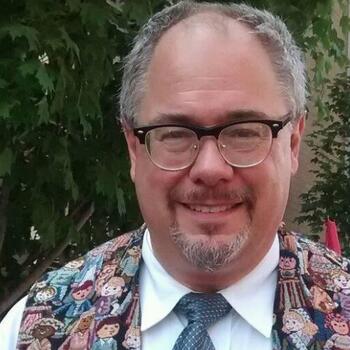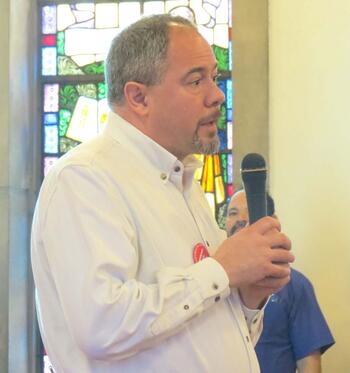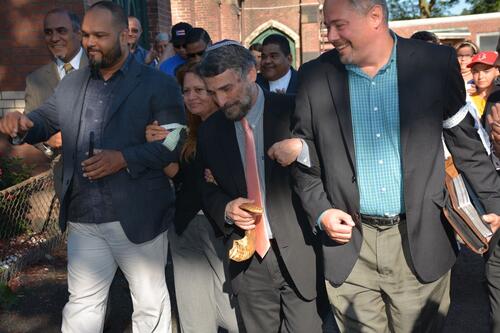By Lauren Yanks ‘19 M.Div.
Do not forget to show hospitality to strangers, for by doing so,
some people have entertained angels without knowing it—Hebrews 13:2
As the Executive Director of Immigration Law & Justice New York, Rev. Paul Fleck ’11 M.Div. has dedicated much of his life to welcoming the stranger and protecting the vulnerable.
 “I really admire immigrants,” he said. “If someone has the ambition and spirit to make it here in search of a better life, why not let them?” Fleck asked. “I think very highly of people who’ve forged their way here.”
“I really admire immigrants,” he said. “If someone has the ambition and spirit to make it here in search of a better life, why not let them?” Fleck asked. “I think very highly of people who’ve forged their way here.”
Fleck’s organization—a nonprofit affiliated with the United Methodist Church and headquartered in New York City—provides legal services for immigrants and educates faith communities and the public about their issues. Fleck also emphasizes its goal of fostering relationships.
“We strive to build community between vulnerable immigrants and volunteers,” he said. “This leads to a mutual transformation. Everyone benefits when we come together.”
Humble beginnings
Fleck did not have much exposure to immigrant life while growing up. Born in 1969 in Northern Indiana, he refers to his childhood as “lily-white.”
“My hometown has about 5,000 people and was quite homogenous,” he said. “I longed for greater diversity before I understood what that was.”
Regardless of the demographics, Fleck’s parents exemplify a life of service. His mother—an assertive woman with strong integrity—worked at a nonprofit providing care for disabled people before retirement, while his father was a lawyer and later a judge who eventually became mayor.
“I call them secret progressives in a conservative town,” Fleck chuckled.
They are also active in the Methodist church, where Fleck spent much of his childhood.
“Church always provided comfort for our family,” he said. “My mother played the organ at services, and my father was a lay leader.”
In school, Fleck excelled at speech and debate—good training for a future lawyer and preacher—and he and his partner won the state championship. He also began a lifelong interest in Latin America.
“I was always intrigued by that part of the world,” he said. “I took Spanish in high school, and we had a Mexican exchange student my junior year in high school. He became like a brother to me.”
Fleck went on to Trinity University in San Antonio, Texas, majoring in political science and Latin American studies.
“San Antonio was very different than my hometown—a cultural immersion,” he said. “I loved it.”
After graduation, Fleck attended the University of Texas School of Law in Austin. At first, he concentrated on business law but quickly realized it wasn’t for him.
“I didn’t appreciate how so many businesses screw the little guy,” he said.
In San Antonio, Fleck met the woman who became his wife—a Brazilian physician—while working in a post-doctoral fellowship. Although divorced, they remain friendly and share a son who is in college.
“She works with the Texas Diabetes Institute and cares for many immigrant patients,” he said.
Life at YDS
In 2008, while still married, the couple moved to the Northeast for her fellowship at Yale New Haven Hospital. It was then that Fleck felt called to study at YDS.
“I looked up to people in ministry and always thought I’d go into it,” he said. “I felt I could make a difference—more so than by practicing law.”
 Fleck values the focus on social justice and community leadership at YDS. He recalls two classes that helped shape him: one was on the memoirs of faith leaders taught by Emilie Townes, and the other on difficult texts taught by Harold Attridge.
Fleck values the focus on social justice and community leadership at YDS. He recalls two classes that helped shape him: one was on the memoirs of faith leaders taught by Emilie Townes, and the other on difficult texts taught by Harold Attridge.
“We brought in texts we struggled with, like Scripture that condemned homosexuality or condoned violence,” said Fleck. “It was a very rich class.”
In his final year, Fleck began working as a pastor at a United Methodist church in New Milford, Conn.
“It was a church of action, which I loved,” he said. “The food pantry was robust, and we went on missions. I stayed for five years.”
In 2010, Fleck was approached by a community organizer seeking to mobilize undocumented immigrants in the New Milford area.
“The experience taught me how to listen,” he said. “I remember the organizer asking a group of immigrants about their reform goals. Finally, a man raised his hand and said he just wanted a driver’s license to take his kids to school.”
This meeting helped lead to the passing of a transformative bill that allowed drivers licenses for undocumented immigrants.
“The bill enabled immigrants to get licenses and insurance, so if there were accidents, they couldn’t be arrested and deported for a minor crime,” said Fleck. “They wanted to be financially responsible.”
Advocacy and sanctuary
After the 2016 presidential election, life grew more difficult for immigrants, leading Fleck to connect with other activists to promote sanctuary in faith-based institutions.
While the idea of sanctuary has always existed, the modern movement started in the 1980s. People from Central America fled violent civil wars, hoping to receive asylum. When the Reagan administration refused, activists and faith communities stepped up.
According to the Smithsonian Institute, in March 1982, six churches around the U.S. began to provide sanctuary for the migrants. Since then, hundreds of faith communities have joined these efforts, and it has been needed. Post-9/11 policies have caused an increase in migrant detentions and deportations, leading to what is now called the New Sanctuary Movement.
“Our work merely stands on the shoulders of others who, for millennia, have provided sanctuary for the vulnerable,” said Fleck.
One of the first people Fleck helped gain sanctuary was a 43-year-old undocumented woman who’d been in the country for more than 20 years but was suddenly given orders to leave the country.

Ultimately, Fleck and his team had 13 faith communities sign on to become sanctuaries. A total of nine people went into sanctuary, and eight came out successfully.
“We were more successful than any other state per capita,” he said.
Kica Matos, President of the National Immigration Law Center, joined Fleck in this work. Matos became involved in immigration issues while running the New Haven-based service agency Junta.
“When the 2016 elections happened, we started organizing,” she said. “Our fundamental question was how to protect immigrants in New Haven, specifically undocumented immigrants. We reached out to faith communities to participate in sanctuary efforts. If somebody faced deportation, their institutions provided shelter and care.”
Matos described Fleck as thoughtful, kind, and “absolutely fearless.”
“Paul uses his privilege to fight for the most vulnerable and speaks truth to power,” she said. “He is careful about how he treads in social justice spaces and has a wonderful sense of humor.”
Rabbi Herbert Brockman of Congregation Mishkan Israel also worked on building sanctuaries with Fleck.
“Paul speaks Spanish, he’s a lawyer, so he brings all of this knowledge,” said Brockman. “It was so important that we came together in this fight. We became partners.”
The two men recently met for breakfast to discuss the outcome of the latest presidential election and preparations being made this time around.
“We approach this work as people of faith,” said Brockman. “The windows in our synagogue are dedicated to the prophets. Martin Luther King Jr. actually came to our synagogue in 1961 and dedicated the sanctuary as a prophet. That’s our common Abrahamic tradition. Sanctuary is shared Scripture.”
An uncertain future
Since the election on November 5, Fleck and his team have worked around the clock.
“Our legal staff is scrambling to protect our clients,” said Fleck. “I believe immigration law is the hardest to practice. It encompasses litigation, administrative law, transactional and criminal law, and you must stay educated on all changes. There were more than 400 changes to the law during the first Trump administration, and it’s only getting worse.”
Fleck shares his fears about mass deportations, detentions, and lack of due process. He especially worries about families being torn apart.
“There are a lot of people who have children who are citizens and must choose where to place those children,” he said. “A number of organizations are helping them set up emergency family plans.”
Fleck’s organization has already led several “Know Your Rights” sessions at various churches around New York City and Long Island, helping immigrants gain a better understanding of the laws and how to deal with Immigration and Customs Enforcement (ICE).
Additionally, as chair of the Immigration Justice Task Group of the New York State Council of Churches, Fleck is collaborating with others on a “Menu for Congregations” that provides greater guidance on handling detainment, deportation, and intensifying sanctuary efforts. “We cannot become complacent,” he said.
Increasing the tension are recent leaks from anonymous sources that report how—on day one—the new administration intends to rescind the established policy that prevents ICE agents from arresting undocumented people at sensitive locations. This includes houses of worship and will only accelerate deportation efforts.
 Regardless, Fleck continues his work.
Regardless, Fleck continues his work.
“This news does not change the imperative for congregations to provide welcome and sanctuary for our immigrant siblings,” he said. “It only changes the consequences. Congregations are going to have to take a deep look inward to see if they can extend themselves outward.”
As the rhetoric continues to heat up, Fleck takes a moment to reflect on his life’s journey, starting with childhood.
“My great hope is that people from my hometown—and others like them—will realize that these folks are our neighbors, and we can be proud of that,” he said. “Embracing diversity is what makes the fabric of our country stronger. Leading with love is true strength.”
Lauren Yanks ’19 M.Div. is a writer and professor and Founder of the Blue Butterfly Foundation, a nonprofit organization that rescues and educates women and children who have been trafficked and enslaved.